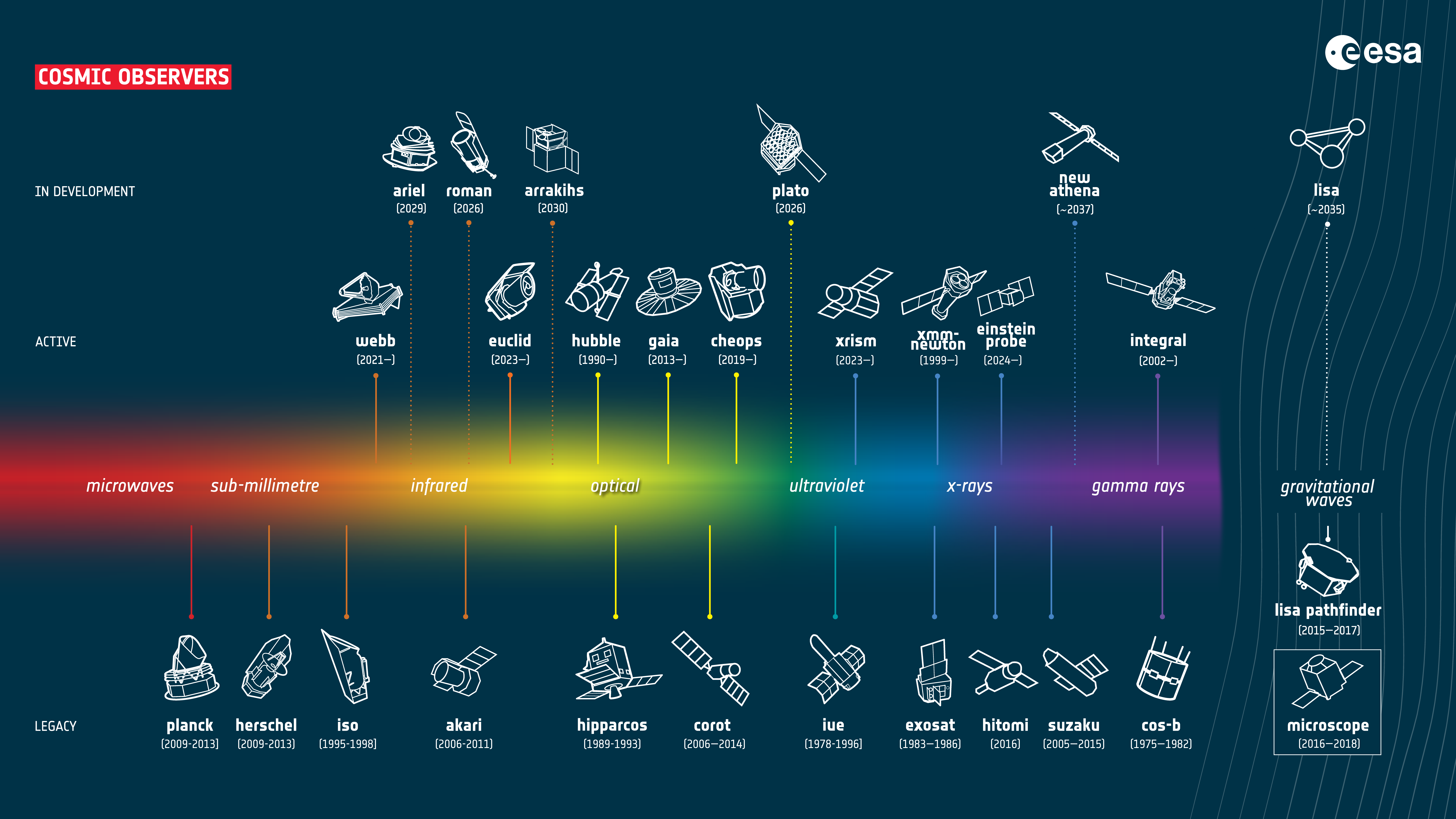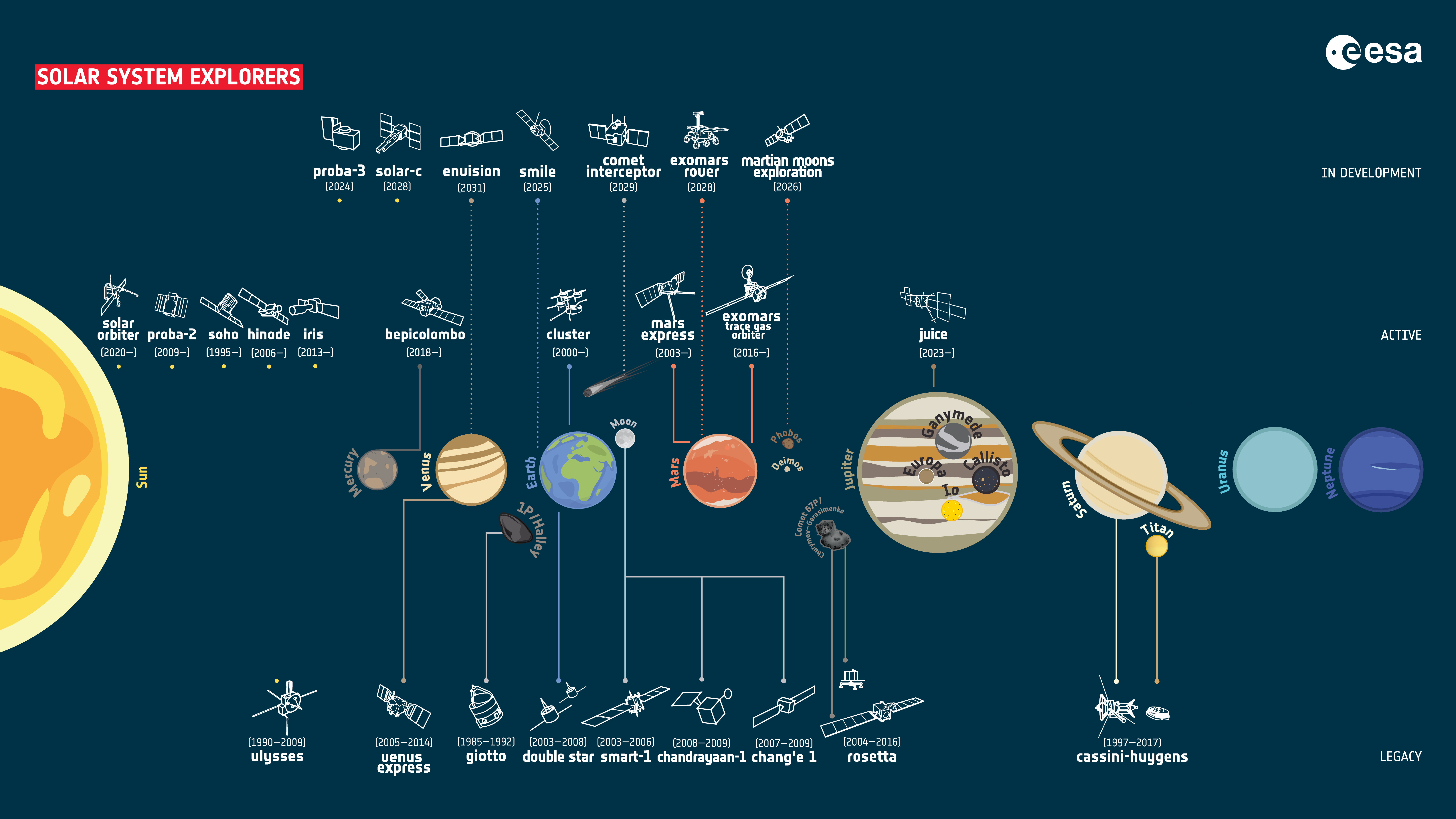Research Fellowships - Space Science Faculty
Research Fellowships in Space Science
Join us to be at the forefront of unveiling the mysteries of our Solar System and the Universe!
ESA's postdoctoral Research Fellowship programme offers early-career scientists and engineers the possibility to carry out research in a variety of disciplines related to space science, space applications or space technology.
Research Fellowships in Space Science specifically offer the opportunity to explore our Solar System and Universe encompassing the fields of heliophysics, planetary science, astrophysics and fundamental physics. ESA Fellowships provide a unique opportunity to work with scientists and engineers at the forefront of space science, and experience first-hand how ESA works with communities across the Member States to maximise the scientific return from our missions.
In the sections below you can find detailed information about the fellowship programme and the application process. Further questions are answered in the FAQ that also includes links to interviews with some of the former fellows.
- Removed a total of (2) style text-align:center;
- Removed a total of (1) style text-align:left;
Programme description
The next round of applications for the Research Fellowship in Space Science will open in mid to late August 2025 with a deadline in mid to late September. Please check back later for more information.
ESA's fleet of COSMIC OBSERVERS |
ESA's fleet of SOLAR SYSTEM EXPLORERS |
|---|---|
|
|
|
| Read more ... | Read more ... |
- Removed a total of (7) style text-align:center;
- Removed a total of (2) style text-align:left;
- Removed a total of (4) align=top;
- Removed a total of (2) style margin:0;
- Removed a total of (1) align=center.
- Removed a total of (1) border attribute.
- Removed a total of (1) cellpadding attribute.
- Removed a total of (1) cellspacing attribute.
ESA's postdoctoral Research Fellowship programme offers early-career scientists the possibility to carry out independent research in a variety of disciplines related to space science, space applications or space technology.
Approximately ~8-10 ESA Fellowships will be offered this year in Space Science, joining the pool of about 25 Research Fellows currently hosted in the Directorate of Science.
Duration: Appointments are for a maximum of three years. The initial project is for two years. An extension for a third year requires a dedicated proposal and is very frequently granted.
Location:
Research Fellowships in Space Science (SCI) can be taken up at any of three locations:
- European Space Astronomy Centre (ESAC) in Villafranca del Castillo near Madrid, Spain
- European Space Research and Technology Centre (ESTEC) in Noordwijk, the Netherlands
- The ESA office at Space Telescope Science Institute (STScI) in Baltimore, Maryland, USA
The European Space Agency maintains a world-leading Science Programme with missions in heliophysics, planetary science, astrophysics and fundamental physics. Within ESA's Directorate of Science, the Science Engagement and Oversight Office (SCI-E) and the Department for Science and Operations (SCI-S), within ESA's Directorate for Science, host the scientists and engineers that oversee the space missions from study to end of operations; they develop the science operation systems for the missions and conduct the science operations in flight; they archive and curate the mission data during operations and beyond. The main objective is to maximise the scientific return of the missions for the benefit of humankind. The Science Engagement and Oversight Office also supports research activities, which are coordinated by the ESA Science Faculty. Research Fellows are encouraged to take leading roles in Faculty research programmes and initiatives, in close collaboration with scientific staff. The Research Fellowship programme nurtures and strengthens the links between ESA and the scientific communities in the Member States.
Research Fellows in Space Science spend their time on their independent scientific research and can choose to spend up to 20% of the time on scientific activities in support of ESA science-related activities (e.g., archive/data science, citizen science, operations, calibration, communication). Research Fellows have no teaching obligations, but do have various opportunities to supervise undergraduate or masters-level student trainees.
Within the Science Directorate, we welcome all independent proposals to conduct innovative research associated with any of the scientific areas covered by the Science Programme missions and projects. The Space Science fellowships can be taken at any of the three sites ESAC, ESTEC or STScI and we encourage applicants to choose a site that allows for best local collaborations. To learn more about the research conducted by the ESA scientists at different sites, please visit the Faculty Member Directory and the pages for the Faculty research groups. There is a separate page for research at the ESA Office at STScI (see also the research of non-ESA scientists at STScI).
Applications are only considered from nationals of one of the following States: Austria, Belgium, the Czech Republic, Denmark, Estonia, Finland, France, Germany, Greece, Hungary, Ireland, Italy, Luxembourg, the Netherlands, Norway, Poland, Portugal, Romania, Spain, Sweden, Switzerland, and the United Kingdom. Nationals from Latvia, Lithuania, Slovakia and Slovenia, as Associate Member States, or Canada as a Cooperating State, can apply as well as those from Bulgaria, Croatia, and Cyprus as European Cooperating States (ECS).
According to the ESA Convention the recruitment of staff must take into account an adequate distribution of posts among nationals of the ESA Member States.
Applicants should have recently completed, or be close to completing their PhD in a technical or scientific discipline. Preference will be given to applications submitted by candidates with up to five years of experience after their PhD.
ESA is an equal opportunity employer, committed to achieving diversity within the workforce and creating an inclusive working environment. For this purpose, we welcome applications from all qualified candidates irrespective of gender, sexual orientation, ethnicity, beliefs, age, disability or other characteristics. Applications from female scientists are encouraged.
There is a single opening for all offered positions. There are no pre-defined projects, applicants are invited to prepare an independent research proposal of a project based on their interests and expertise. To apply, you will have to use the interface operated by ESA Human Resources using this link: https://jobs.esa.int/job/Baltimore-Internal-Research-Fellow-%28PostDoc%29-in-the-Directorate-of-Science-at-ESTEC%2C-ESAC-or-STScl-MD-21201/1112890001/
All ESA vacancy notices can be seen under: https://career2.successfactors.eu/career?company=esa.
Required application Materials:
Four separate documents are required:
- A motivation letter;
- Your CV
- A list of publications. This needs to be separate from the CV. For publications that are not first-authored, please shortly explain your individual contribution.
- A research proposal (4 pages maximum including any figures or tables with a minimum font size of 11pt and references, where a smaller font is allowed). The proposal is expected to cover (1) the research rationale, (2) impact and past achievements, (3) research plans for the fellowship (with rough time line), (4) synergies with mission-related activities and scientists at ESA.
Further information required for the online application form includes: the contact information of three persons willing to provide references and a prioritised list of which ESA establishment(s) you would like to join (ESAC, ESTEC, or STScI). Note that at the time of application, reference letters are not required, only the contact information of three possible references.
The review committee will consist of members with diverse areas of expertise. Therefore the application should be written for a general audience of space scientists and astrophysicists. The application will be evaluated with respect to scientific excellence of the candidate (past achievements), proposed research at ESA (feasibility, future impact), and synergies with existing ESA research activities at the selected site. See also Further Questions, Tips and Hints
Inquiries regarding the application process can be sent at any time to the fellowship coordinator. The expected timeline for the 2024 campaign is listed below. Please note that the dates are not final and may change:
Long-listed candidates will be contacted late October for a recorded video interview and they will be invited to a science jamboree for an exchange with the Faculty scientists and the current fellows. The jamboree will take place on 12-14 November 2024.
Short-listed candidates will be invited mid-December to a short online interview taking place on 20-22 January 2025.
Offers are expected to be made by the first week of February 2025.
Start of the fellowship: autumn 2025 (special arrangements for an earlier or later start can be negotiated on a case by case basis if necessary).
Research expenses: publication charges, attendance of conferences, participation in observing campaigns and/or research visits, etc. for the ESA Research Fellows are covered by the programme.
Science Visitor Programme: Science Research Fellows have access to the Science Visitor Programme, funded by the ESA Faculty, which facilitates visits of external collaborators to ESA sites.
Student/trainee supervision: Research Fellows have various opportunities to request funding for and/or supervise undergraduate or masters-level students, for example through ESA traineeship programmes, throigh the Leiden/ESA Astrophysics Program for Summer Students or through collaborations with local universities for master thesis supervision.
Additional research funding: as faculty members, Research Fellows are eligible to request funding through the faculty for activities requiring substantial additional funding (e.g. for hardware, organisation of conferences and workshops, kickstarting new collaborative projects, etc.).
Mentorship Programme: as independent early-career researchers, Research Fellows are more in need of guidance than supervision. New fellows are thus invited to select a main mentor who will guide and support with general issues, including those not necessarily related to the direct research field. Mentors are especially meant to support fellows with their future orientation and job search. Any member of ESA science faculty can act as mentor. Candidates are welcome and encouraged to contact any scientist within the Directorate of Science as a prospective mentor prior to their application.
Science Platform access: access to hardware and services facilitating (collaborative) data-intensive research, including pre-configured environments, GPUs, and a community of experienced users.
For terms and conditions we refer to the General Description.
Typical net monthly remuneration varies between circa 3200 and 4100 Euros depending on the local purchasing power at duty station (ESAC or ESTEC) and years of experience after the PhD. The net monthly remuneration is around $4500 for the fellows at STScI. Additional allowances are provided for family members (registered partners and children), subject to conditions.
Health coverage under ESA’s social security scheme includes medical expenses, invalidity and death benefits. Pension benefits are also included.
Research Fellows working at STScI (Baltimore, USA) will be issued a G4 visa.
Further clarifications, tips and hints are given in the Science Fellowship FAQ.
Contact
For further inquiries, feel free to contact the Head of the Science Research Fellowship Programme.
The Space Science Faculty Directory lists all the members and their interests.
To contact any person by email, please use the address given on their profile page, or use:
firstname.lastname@esa.int
Current Space Science Research Fellows will be happy to share any experience with you. You can also read shot project descriptions from fellows hired in the previous years: 2021, 2022, 2023, and 2024.








































 Sign in
Sign in
 Science & Technology
Science & Technology

